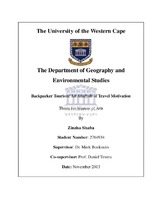| dc.description.abstract | Backpacker tourism is a niche market of tourism that has been rapidly growing, South Africa in particular has become an increasingly popular destination for backpacker tourism (Visser 2004). Academic interest in backpacker tourism research has grown in recent years, although the current literature on backpacker tourism has focused on the economic significance and impacts with little empirical research conducted on the characteristics, motivations and behaviors. Cohen (2003) stresses that future research should stop referring to backpacking as if it were a homogeneous phenomenon, and should rather focus on its diverse manifestations in terms of origins, age, gender, class, nationality and cultural backgrounds of backpackers. Since backpacker tourism is a growing market it is important for the destination to understand the specifics and capabilities of the market in order to create sustainable products. The main aim of
this research is to segment the backpacker tourism market in South Africa, in order to ascertain if any significant sub-groups exist. Both qualitative and quantitative methods were utilised to collect data including a distribution of 202 questionnaire surveys to backpackers within backpacker hostels and also participant observation was employed to gain an in-depth understanding of the phenomena. Factor and cluster analysis was used to analyse the data. The following motive-based segments were identified: Self-developers/ Learners, Experience Seekers, Escapers/ Independence, Adventures/ Social Seekers. The results revealed that these segments do illustrate an increase in the heterogeneity of backpacker tourism. The reason these sub-groups of backpackers are depicted in South Africa is to address the underlying desires of backpackers in order to satisfy their needs. | en_US |

